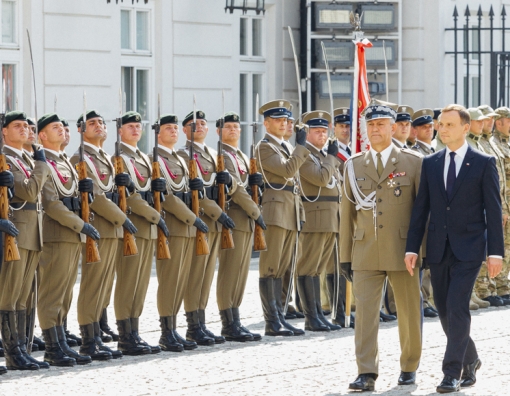 Barely a week into his term, Poland’s new president is moving to realize a hallmark campaign promise: To pivot central Europe’s most important country to closer security ties with its immediate eastern neighbors.
Barely a week into his term, Poland’s new president is moving to realize a hallmark campaign promise: To pivot central Europe’s most important country to closer security ties with its immediate eastern neighbors.
In so doing, Andrzej Duda courts confrontation with Russia and strains in Poland’s recent good vibes with Berlin and Brussels. It is a risk that the 43-year-old, right-wing leader sounds eager to run.
“Poland’s foreign policy doesn’t need a revolution,” Duda said in an interview with POLITICO, “but it does need a correction.”
A small but telling sign of the new Polish orientation was this week’s announcement of the destination for his first overseas trip on August 23: Estonia, the small Baltic nation and NATO ally that sits on the doorstep of a newly assertive Russia. Brussels isn’t on his immediate travel itinerary.
“I think we can intensify relations with our partners, especially when it comes to the countries of central and eastern Europe,” Duda said. “I would like Poland to be a country which could in times of need lend a hand and help those who are weaker.”
He called Russia’s military intervention in Ukraine the past 18 months “alarming” and “a rebirth of the imperial spirit, of imperial nostalgia” that threatens other neighbors. He wants Poland to do more in response.
Poland could be a “security guarantor” of the three Baltic states, he said. The country has the largest military in the region and is in the midst of an expensive defense modernization program.
His office is calling for a summit of central European leaders in November to push for a large and permanent NATO ground presence in the region. Moscow has always condemned such ideas, which are also resisted by Berlin and other western European allies who see it as provocative and a violation of a 1997 accord between the alliance and Russia.
Speaking over the roar of airplane engines on his way back to Warsaw last Thursday after a visit to a Polish-German-Danish regional NATO headquarters in Szczecin — the only permanent alliance base in formerly communist central Europe — Duda said that his priority would be to overcome German resistance to an expanded NATO ground presence in the region. His second overseas destination as president is Berlin.
Echoing the views of Estonia’s hawkish President Toomas Ilves, Duda is eager to strengthen the security ties with the U.S. and see American GIs on his soil.
“Today we are the border of NATO and it would be good if we were a really significant flank. And that will happen when NATO is present here. Really present, not only symbolically,” Duda said. He wants “American armies, or joint Polish-American bases” in Poland, he added.
Image: Polish President Andrzej Duda, August 6, 2015 (photo: Eliza Radzikowska-Bialobrzewska/Office of the President)
